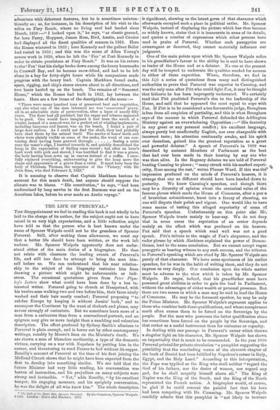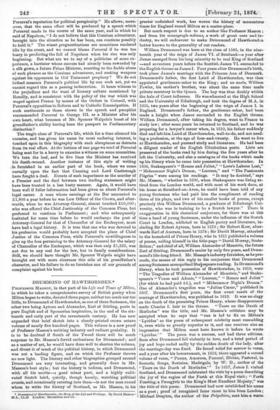THE LIFE OF PERCEVAL.*
THE disappointment we feel in reading this book is not wholly to be laid to the charge of its author, for the subject ought not to have raised in us very high expectations, and a little reflection might have told us that the person who is best known under the name of Spencer Walpole could not be the grandson of Spencer Perceval. Still, after making these allowances, we must say that a better life should have been written, or the work left undone. Mr. Spencer Walpole apparently does not under- stand either of the main duties of a biographer. He does not relate with clearness the leading events of Perceval's life, and still less does he attempt to bring the man him- self before us. We can understand that his near relation- ship to the subject of the biography restrains him from drawing a picture which might be unfavourable or ludi- crous. The occasional quotations given from Peter Plym-
1 e y's Letters show what could have been done by a less in- terested writer. Perceval going to church at Hampstead, with his twelve sons walking two and two before him, their faces nicely washed and their hair neatly combed ; Perceval proposing "to subdue Europe by keeping it without Jesuits' bark," and to reconquer the Continent by the want of rhubarb and plums, may savour strongly of caricature. But we sometimes learn more of a man from a caricature than from a conventional portrait, and an epigram may give us more insight than a rambling and colourless description. The effect produced by Sydney Smith's allusions to Perceval is plain enough, and is borne out by other contemporary writings, notably by Bloore's lines on the Minister's death. We are shown a man of blameless mediocrity, a type of the domestic virtues, carrying on a war with Napoleon by putting him in the corner, and threatening to send France to bed without its supper. Romilly's account of Perceval at the time of his first joining the Midland Circuit shows that he might have been expected from the first to. develop into something similar. We are told that the future Minister bad very little reading, his conversation was barren of instruction, and his prejudices on many subjects were strong and invincible. "Yet," adds Romilly, "by his excellent temper, his engaging manners, and his sprightly conversation, he was the delight of all who knew him." The whole description
• The Life of the Right Hon. Spencer Ferment. By his Grandson, Spencer Walpole. 2 vols. London: Hurst and Blackett. 1874.
is significant, showing us the latent germ of that character which afterwards occupied such a place in political satire. Mr. Spencer Walpole, instead of displacing the picture which has thus become so widely known, states that it is inaccurate in some of its details, and quotes a number of expressions which other persons have used in praise of Perceval. Whether such panegyrics are extravagant or deserved, they cannot materially influence our judgment.
One of the main points upon which Mr. Spencer Walpole relies in his grandfather's favour is the ability he is said to have shown as leader of the House and as a debater. No one at the present day will be tempted to underrate the qualities needed for success i❑ either of these capacities. When, therefore, we find in this Life a series of quotations from many and distinguished authorities to prove that Perceval was superior to Canning, and was the only man after Pitt who could fight Fox, it may be thought that hitherto he has been improperly underrated. We certainly read that Pitt predicted Perceval's rise to the leadership of the House, and said that he appeared the most equal to cope with Fox. If Pitt is to be considered a too favourable judge, Brougham is free from all suspicion of partiality, and this is what Brougham says of the manner in which Perceval defended the Addington Ministry against an overwhelming Opposition :—" His dexterity in any great or any personal conflict; his excellent language, always purely but unaffectedly English, nor ever chargeable with incorrect taste ; his attention continually awake, and his spirit ever dauntless, gained him the greatest reputation as a great and powerful debater." A speech of Perceval's in 1809 was described by eminent Members of Parliament as the best that had ever been made in their hearing by any one who was then alive. In the Regency debates we are told of Perceval beating Canning to pieces ; " many struck with his marked superi- ority, Rose among the rest," writes Plumer Ward. If this was the impression produced on the minds of Perceval's hearers, it is strange that one so different should have been handed down to
posterity. We know Canning's speeches, and though there may be a diyersity of opinion about the oratorical value of the famous phrase which made the House of Commons, after a paw e of breathless astonishment, burst into a frenzy of cheering, no one will dispute their polish and vigour. One would like to have some means of testing this alleged superiority of some of
Perceval's speeches. Unfortunately on this point also Mr„ Spencer Walpole trusts mainly to hear-say. We do not deny that in some cases the reputation of an orator depends mainly on the effect which was produced on his hearers. Fox said that a speech which read well was not a good speech. Pitt's tribute to the magic of Fox's eloquence, and the ruder phrase by which /Eachines explained the power of Demos- thenes, lead to the same conclusion. But we cannot accept vague panegyric as bearing witness to any such success, and the tributes to Perceval's speaking which are cited by Mr. Spencer Walpole are purely of that character. We have some specimens of his earlier speeches, for he was in the habit of writing them, and they do not impress us very deeply. Our conclusion upon the whole matter must be adverse to the view which is taken by Mr. Spencer Walpole. He urges, indeed, that his grandfather must have possessed great abilities in order to gain the lead in Parliament, without the advantages of either wealth or personal presence. But there are two senses in which a man may be said to lead the House of Commons. He may be the foremost speaker, he may be only the Prime Minister. Mr. Spencer Walpole's argument applies to• those who combine both these qualifications, and whose conspicuous merit often causes them to be forced on the Sovereign by the people. But the man who possesses the latter qualification alone has sometimes been forced on the people by the Sovereign, and that rather as a useful instrument than for eminence or capacity.
In dealing with one passage in Perceval's career which throws a singular light on his character, Mr. Spencer Walpole has shown an impartiality that is much to be commended. In the year 1800 Perceval printed for private circulation " a pamphlet suggesting the possibility that the concluding verses of the eleventh chapter of the book of Daniel had been fulfilled by Napoleon's career in Italy, Egypt, and the Holy Land." According to this interpretation, the Pope was typified as the King who shall neither "regard the God of his fathers, nor the desire of women, nor regard any god, for he shall magnify himself above all." The King of Naples was the King of the South, and the King of the North. represented the French nation. A biographer would, of course, be glad -if he could conceal the painful fact that his hero had been competing with Dr. Cumming. Mr. Spencer Walpole candidly admits that this pamphlet is "not likely to increase
Perceval's reputation for political perspicuity." He allows, more- over, that the same effect will be produced by a speech which Perceval made in the course of the same year, and in which he said of Napoleon, " I do not believe that this Corsican adventurer, brought into the situation as he has been, can continue possibly to hold it." The wisest prognostications are sometimes rendered idle by the event, and we cannot blame Perceval if he was too tasty in predicting the fall of Napoleon when his rise was only beginning. But what are we to say of a politician of some ex- perience, a barrister whose success had already been rewarded by a silk gown, a future Prime Minister, resorting to the feeble abuse of such phrases as the Corsican adventurer, and seeking weapons against his opponents in Old Testament prophecy ? We do not indeed measure Perceval's political life by one such act, yet we cannot regard this as a passing indiscretion. It bears witness to the prejudices and the want of literary culture mentioned by Romilly, and is consistent with the policy of the war which was waged against France by means of the Orders in Council, with Perceval's opposition to Reform and to Catholic Emancipation. If such sentiments as those shown in the speech and pamphlet recommended Perceval to George III. as a Minister after his own heart, what becomes of Mr. Spencer Walpole's boast of his grandfather's ability having been the passport to Parliamentary distinction ?
The tragic close of Perceval's life, which for a time silenced his enemies, and has given his name its most enduring interest, is touched upon in this biography with such abruptness as detracts from its real effect. At the bottom of one page we read of Perceval being sent for in a hurry to examine a witness on some committee. We turn the leaf, and in five lines the Minister has received his death-wound. Another instance of this style of writing is furnished in an earlier part of the book, where we come casually upon the fact that Canning and Lord Castlereagh have fought a duel. Events of such importance as the murder of a Premier and the duel between two leading statesmen might have been treated in a leas hasty manner. Again, it would have been well if faller information had been given us about Perceval's legal career. A man whose earnings at the Bar amounted to 11,800 a year before he was Law Officer of the Crown, and after- wards, when he was Attorney-General, almost touched £10,000 ; who was offered the Chief Justiceship of the Common Pleas, but preferred to continue in Parliament ; and who subsequently hesitated for some time before he would exchange the post of Attorney-General for that of Chancellor of the Exchequer, must have had a legal history. It is true that one who was devoted to his profession would probably have accepted the place of Chief Justice of the Common Pleas, while Perceval's unwillingness to give up the fees pertaining to the Attorney-General for the salary of Chancellor of the Exchequer, which was then only £1,323, was not due to any zeal for the law, but to family considerations. Still, we should have thought Mr. Spencer Walpole might have brought out with more clearness this side of his grandfather's character, and his failure to do so furnishes one of our grounds of complaint against his book.



































 Previous page
Previous page